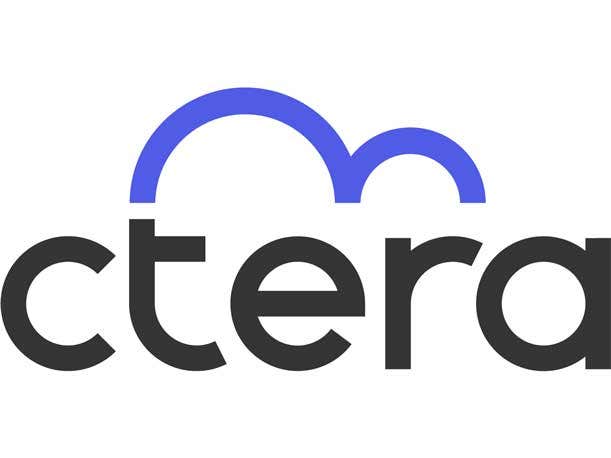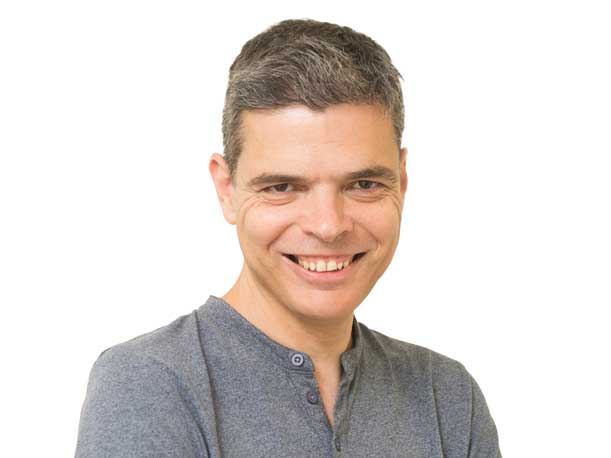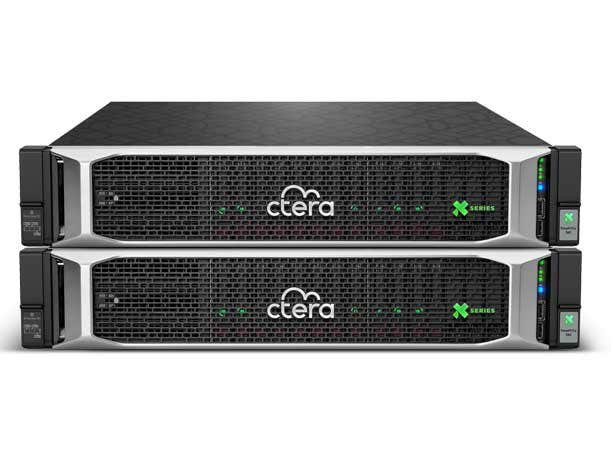New Ctera CEO Oded Nagel: ‘We Will Focus On Partners, Partners, Partners’
‘We believe that the best way, and let’s say the most scalable way, [to compete] is to go full channel. And we’re going to invest more in channel building. We are going to launch a new partner program where we’re extending and expanding our partnership with our strategic partners,’ says Oded Nagel, Ctera’s new CEO.

Making Room For Change
Ctera, a leading provider of edge-to-cloud global file services, Wednesday unveiled a new executive team tasked with helping the company achieve its next stage of growth after a year in which it grew its revenue, all of which comes from subscription licenses, by 40 percent over 2021.
The changes at the top include Oded Nagel, who moves from chief strategy officer to CEO; Michael Amselem from sales vice president to CRO; and Saimon Michelson from vice president and field CTO to vice president of alliances.
At the same time, Liran Eshel, who co-founded Ctera in 2008, is giving up his CEO seat to become the New York-based company’s new executive chairman, where he will focus on Ctera’s key strategic initiatives.
[Related: 2022 Storage 100: Who’s Got Your Backup?]
Nagel, in an exclusive meeting via a videoconference call with CRN from Israel, said the moves come as privately owned Ctera had a very good 2022 but now the time is right to take the company to a new level.
“[Liran’s] going to be working on positioning staff, thinking about how to position the company in different ways, and more things that require [in-depth] discussion on where we want to be, and not really [having] an active role in managing the sales operations, the sales team, the engineering,” he said.
This is an important move for a company that depends on channel partners to sell subscription licenses for all of its revenue, Nagel said.
And, he said, this is being done in a very competitive global file services market where Ctera is not only facing focused competitors like Nasuni and Panzura, but also large established legacy NAS vendors like NetApp, Dell Technologies with its EMC line and Microsoft.
“We believe that the best way, and let’s say the most scalable way, [to compete] is to go full channel,” he said. “And we’re going to invest more in channel building. We are going to launch a new partner program where we’re extending and expanding our partnership with our strategic partners.”
Here is more about Ctera’s plans from its new CEO.

Congratulations on becoming CEO of Ctera. What’s going on there?
I’ve been with Ctera since day one when we founded the company. I’m not an official founder. But I’ve been there from day one, part of the core team. I’ve been working with Liran Eshel, our CEO and the founder of the company, almost 20 years. We did another startup company, Check Point. Then in 2008, Liran established Ctera. In the last five years, I [had] quite a lot of roles in the company, managing a lot of departments and moving between different roles. I was focused on product management and on signing our largest partnerships like HPE, IBM and others. Last year was a very, very good year to Ctera. We grew quite well. And then Liran and I decided that it’s a good time to do a change in the company to see how we can take the company to the next level. So Liran moved to an active chairman role and being a part of the board helping with strategic discussions and strategic directions. We wanted to do that a long time. But when you’re busy managing a company, it was hard to do. And I am now the CEO.
Let’s step back a bit. First of all, how do you describe Ctera?
So first of all, I would say two things. On the security side, Ctera is the leader in the secure file services space. That’s something we’ve done for many years, especially focusing on edge to core to cloud. And we’re really doing very well with selling to large enterprises with many remote offices which are concerned about their security. That’s what we’ve done for so many years. In the last two or three years, we expanded our offering and we’re focused on three main pillars. One is what we call DevOps-centric solutions, which are really focused on automating and allowing newer storage guys to manage global file systems in a much more modern way. The second is cyber-resilient storage. We are the most secure platform today in the industry for file services, but we’re adding more and more capabilities like ransomware detection, AI technology and machine learning technology. We’re doing some different technology for WORM [write once, read many] and retention policies. So there’s a lot of security behind the solution. …
And the last point we focus on is data services. We are adding a lot of connectors, a lot of capabilities so customers can integrate with different systems such as Snowflake, with cloud analytics use cases, or other enterprise platforms like Varonis from the security side, and many other things that provide insight into the metadata of the global file system and to help make decisions. So that’s on the product side how the company evolved.
On a personal level, I will tell you that I think that Ctera is like a family. And that’s really the essence of the company. Liran and I, as I said before, were working together for so many years as has the management team as a group.

So going forward, Liran Eshel (pictured) will be more involved in company strategy and no longer with the day-to-day part of the business, right?
He’s going to be working on positioning staff, thinking about how to position the company in different ways, and more things that require [in-depth] discussion on where we want to be, and not really [having] an active role in managing the sales operations, the sales team, the engineering.
You said Ctera is a fast-growing company. Can you share some information about that growth? Some numbers?
Obviously, we are a private company, so we can’t share the numbers. But last year, we grew our revenue around 40 percent. ARR [annual recurring revenue], actually. We are an all-ARR-based company. We sell only subscription licenses. Most of the time, it’s between a one-year to three-year license, depending on the contract length, but it’s all subscription. So we are ARR-driven. We sell mainly to large enterprises. We serve today the top three banks in the world, the top three legal firms in the world, the top three media and advertising companies in the world. So really large organizations. And we also have very good growth in the number of files and petabytes that we are managing. We manage more than 150 petabytes and billions of files. We have customers managing in our global file system more than 10 billion files. That’s something very, very scalable and unique. And we see this growing every year. One of our largest customers is the Department of Veterans Affairs. [Last year we announced] we have been hosting all the medical images for the VA for almost two years now. And it’s crazy how all the unstructured data there is growing.

Ctera works exclusively through indirect channels, correct?
Yes, I would say 95-plus percent of our business is coming from channels. We have either strategic partners like HPE, IBM and so on. And we are, by the way, working on a very strategic partnership as we speak. I cannot talk about it yet. And we also work with regional and multinational partners like WWT [World Wide Technology], SHI and many other partners all over the globe.
Who would you consider to be your primary competition?
There are two types of competitors. One is what I call the direct competitors that are playing in the same space as we are, such as Nasuni and Panzura. Those are our main competitors. But on the other hand, where we really compete, and this is where we see the opportunity in the market, are the legacy NAS vendors like NetApp and EMC and Microsoft. These are the companies that have dominated the NAS market, the file services market, for so many years. And the market is billions of dollars. Everybody can give you different numbers, but it’s $7 billion to $10 billion, depending if you’re talking about human-generated data or including machine-generated data, which are growing very fast. Most of the time, we are competing against the legacy guys. We have some competition against Nasuni and Panzura, but the market is so big, and all three of us are still relatively very small compared to what we can sell.

Is there room in the future for both the dedicated cloud file system companies and the legacy NAS companies? Or do you see any strategic change in how the market develops going forward?
I think I see the big guys trying to add functionality, but they’re failing all the time. NetApp acquired a company, Talon, in this space a few years ago, and they couldn’t really take it to the next level. [Dell] EMC bought TwinStrata and tried to make it the global file system, but they couldn’t do it. No one can know what will happen. But I think that we have a very unique technology that took us years to develop. Developing a scalable global file system is not an easy task. It’s hard. That’s why it takes a lot of time. …
You see Gartner analysts now talk about hybrid file cloud storage. And analysts understand there is a place for global file systems, especially after COVID when everyone’s working from home and the data is not just in the data center. A lot of data is generated at the edge. So I think the market will definitely evolve more and more, and more customers will look to modernize the way they manage their file services today. I think that it will take another five years, but that will be more or less the primary solution that these enterprises will look for.
So looking forward to the rest of 2023, what are some strategic areas you want to see Ctera focused on?
So from the go-to-market point of view, we will focus on partners, partners, partners. We believe that the best way, and let’s say the most scalable way, is to go full channel. And we’re going to invest more in channel building. We are going to launch a new partner program where we’re extending and expanding our partnership with our strategic partners. And give them more tools to promote our solutions as well.
On the product side, we see three opportunities in the market. We will focus a lot on data services. That’s a key element in our component. And we see huge benefits from allowing customers to connect into our global file system and really understand what’s going on inside the global file system. Because for me, knowledge is power. And once we manage the metadata, and we give this information to the customers, they can do a lot of things with the metadata. The second is cyber resilience, given that our background is security. And I think security, especially on the file side, is very, very important. And that’s something we will add a lot of emphasis to from the product point of view. And the third is what we call data ops and DevOps. That’s the new world, right? In the past, you had storage managers doing things like connecting disks to VMware and expanding the RAID and so on. Now, everything is much more DevOps-oriented. They want to do everything with Python scripts, APIs, things like that. And that’s one of the main assets of our platform.